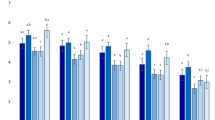Abstract
This paper focuses on experiences from a case study dealing with the Swiss type of a consensus conference called “PubliForum” concerning “Genetic Technology and Nutrition” (1999). Societal and ethical aspects of genetically modified food meanwhile can be seen as prototypes of topics depending on the involvement of the public through a participatory process. The important role of the lay perspective in this field seems to be accepted in practice. Nevertheless, there is still some theoretical controversy about the necessity and democratic legitimacy of participatory processes in general, and especially about those dealing with technological or environmental problems (sustainable development) concerning society. From an ethical point of view, a lot of heterogeneous problems concerning contents and procedures of public participation can be pointed out, not only on the theoretical level but also in practice, e.g., concerning the communication process between laypersons and experts. The intention of our paper is to give hints and to clarify criteria that support the communication process leading to a dialog of autonomous citizens and which especially consider ethical aspects in the field. One important result is that there must be an orientation for all members of a consensus conference having clear rules and knowing their different roles that support transparency, credibility, and fairness of the whole procedure and a “good product”: a substantial final document or citizens’ report.
Similar content being viewed by others
References
Böhler, D., M. Kettner, and G. Skirbekk (eds.) (2003), Reflexion und Verantwortung (Reflection and responsibility), Frankfurt a.M.: Suhrkamp
Egger, U. (2000), Hinweise zur Rolle des Mediators beim PubliForum (Remarks concerning the role of the facilitator at the PubliForum), Dokument TA DT 27/2000, ed. Schweizerischer Wissenschafts- und Technologierat, Bern
Frewer L., J. Lassen, B. Kettlitz, J. Scholderer, V. Beekman, K. G. Berdal (2004) Societal Aspects of Genetically Modified Foods. Food and Chemical Toxicology 42: pp. 1181–1193
Habermas J. (1996) Drei normative Modelle der Demokratie (Three Normative Models of Democracy). in Habermas J. (ed.) Die Einbeziehung des Anderen, Studien zur politischen Theorie. Suhrkamp, Frankfurt a.M, pp. 11–24
Habermas J. (2001) Die Zukunft der menschlichen Natur, Auf dem Weg zu einer liberalen Eugenik? (The Future of the Human Nature, on the Way to a Liberal Eugenics?) Suhrkamp, Frankfurt a. M
Heeger R., F. W. A. Brom (2003) Ernährung, Verbraucher und Staat. (Nutrition, Consumer and State). in Düwell M., Steigleder K. (eds.) Bioethik, Eine Einführung. Suhrkamp, Frankfurt a. M., pp. 371–378
Heinrich, H. (2005), “Partizipationsforschung und nachhaltige Entwicklung” (Participation research and sustainable development) and Gethmann, C. F. (2005), ”Partizipation als Modus sozialer Selbstorganisation? Einige kritische Fragen.“ (Participation as a mode of social self-organization? Some critical questions.) GAIA 14/1, pp. 30–33
Joss S., S. Bellucci (eds.) (2002) Participatory Technology Assessment, European Perspectives. Centre for the Study of Democracy, London
Korf, B. “Partizipation als Tyrannei?” (Participation as tyranny?) and Renn, O. (2005), “Partizipation – ein schillernder Begriff” (Participation – an ambiguous concept) GAIA 14/3, pp. 224–228
Nielsen, A. P., B. Skorupinski, H. W. Ingensiep, H. Baranzke, J. Lassen, and P. Sandoe (2005), “Participatory Arrangements (WP2),” in V. Beekman (ed.), Development of Ethical Bio-Technology Assessment Tools for Agriculture and Food Production, Interim Report, The Hague: LEI, pp. 40–61
PubliForum (1999a), Gentechnik und Ernährung 4.–7. Juni 1999 in Bern, Bericht des Bürgerpanels (Citizens´ Report: Gene technology and nutrition) (TA-P/1999 d), Bern: Schweizer Wissenschaftsrat
PubliForum (1999b), Gentechnik und Ernährung, Medienspiegel Oktober 1999 (Gene technology and nutrition, mirror of media), Bern: TA-Swiss
Reber B. (2004) Ethique et évaluation technologique participative in Castagna B., Gallais S., Ricaud P., Roy J.-P., (eds.) La situation délibérative dans le débat public, 2, Presses Universitaires François Rabelais, Tours pp. 387–405
Reber B. (2005) Technologies et débat démocratique en Europe Revue Française de Science Politique 55: 811–833
Schwab, F. (2000), Konsens-Konferenzen über Genfood, Ist das PubliForum der Schweiz ein Sonderfall? (Consensus conferences about gene food – Is the Swiss PubliForum a special case?) Bern
Skorupinski B., K. Ott (2000) Technikfolgenabschätzung und Ethik, Eine Verhältnisbestimmung in Theorie und Praxis (Technology assessment and ethics –determining a relationship in theory and practice) Hochschulverlag AG an der ETH, Zürich
Skorupinski B., K. Ott (eds.) (2001) Ethik und Technikfolgenabschätzung, Beiträge zu einem schwierigen Verhältnis (Ethics and Technology-assessment, Contributions to a Difficult Relation) Helbing & Lichtenhahn, Ökologie und Gesellschaft Bd. 16, Basel, Genf, München
Skorupinski B., Ott K. (2002) Technology Assessment and Ethics – Determining a Relationship in Theory and Practice. Poiesis & Praxis, International Journal of Technology Assessment and Ethics of Science 1: 95–122
Skorupinski B. (2003) Novel Food – Ethische Perspektiven (Novel food – ethical perspectives) In Düwell M., K. Steigleder (eds.) Bioethik, Eine Einführung Suhrkamp, Frankfurt a.M., pp. 379–387
Smith G. (2003) Deliberative Democracy and the Environment. Routledge, London/New York
Zittel, T. (2003), “Participatory Democracy and Political Participation.” Paper presented to the Joint Sessions of Workshops of the European Consortium of Political Research, Edinburgh (Workshop: Bringing the Citizens back in participatory democracy and political participation) 16 p
Author information
Authors and Affiliations
Corresponding author
Additional information
This paper presents results of the project Ethical Bio-TA Tools as funded by the European Commission, DG Research, under FP5, Quality of Life Programme.
Rights and permissions
About this article
Cite this article
Skorupinski, B., Baranzke, H., Ingensiep, H.W. et al. Consensus Conferences – A Case Study: Publiforum in Switzerland with Special Respect to the Role of Lay Persons and Ethics. J Agric Environ Ethics 20, 37–52 (2007). https://doi.org/10.1007/s10806-006-9016-7
Accepted:
Published:
Issue Date:
DOI: https://doi.org/10.1007/s10806-006-9016-7




